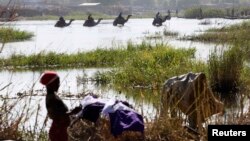2014 was a turbulent year for human rights in Africa, says Human Rights Watch in its annual report released Thursday. The international watchdog group says sectarian violence and “abusive responses of government forces” fueled many conflicts in the last year. Released on the eve of the African Union summit, the report also notes that African leaders have been too slow -- or too unwilling -- to react.
The rights group report comes just as Africa’s heads of state began to converge on Ethiopia’s capital for the annual African Union summit.
The report echoes the main topics of this year’s summit: the West African Ebola epidemic, Nigeria’s brutal Boko Haram militants, and the conflict and instability in several African states.
But one thing is missing from that discussion, say Human Rights Watch researchers: strong political will to improve human rights across Africa.
African leaders
The AU has consistently supported its own, voting in 2014 to give sitting African leaders and senior officials immunity from prosecution. And the continental body has awarded its presidency to several leaders who have been accused of heinous and widespread rights abuses, like Libya’s Moammar Gadhafi, Equatorial Guinea’s Teodoro Obiang and -- next in line -- Zimbabwe’s Robert Mugabe.
Aisling Reidy is a senior legal advisor for Human Rights Watch. She said the AU not only has the potential to radically improve human rights on the continent -- it also has the muscle and the manpower.
“They absolutely could make a difference. That resolution," said Reidy, referring to Mugabe's impunity, "is absolutely unacceptable. The idea that leaders, in their self-interest, are going to try to create some immunity. It’s no longer acceptable in an era where we have the International Criminal Court, the first sitting criminal court, where we have the African courts set up.
"We're talking about crimes against humanity, and war crimes and torture. So if the AU was to put aside its short-term political interests and look at the interests of the people of Africa as a whole, it has the instruments at its disposal,” she said.
Reidy also noted some small advances in human rights, notably the AU’s efforts to establish a court in Senegal to try Chad’s former dictator, Hissene Habre.
Nigerian army
Andrew Stroehlein, European media direct of Human Rights Watch, said human rights are central to the escalating conflict in Nigeria.
He said the Nigerian army often has responded to the threat from the militant Islamist group Boko Haram by using abuse, and that has only escalated the conflict.
“At almost every step you see the reaction of the Nigerian security forces is to lash out, take absolutely no consideration of human rights, people do not feel that their state is not protecting them, and some people feel the state is attacking them, and it acts as a recruiting call for insurgents,” said Stroehlein.
Boko Haram
Boko Haram launched a major insurgency in northeastern Nigeria in 2009 aimed at establishing an Islamic state. It has since carried out a series of violent attacks in northern Nigeria, and now controls several towns where it has declared a caliphate.
Earlier this week another human rights group, Amnesty International, accused the Nigerian army of failing to protect civilians in the town of Baga from a Boko Haram attack that killed at least 150 people. Amnesty quoted an unnamed senior army source as saying the Islamist militants had told residents about the offensive.
Nigeria’s defense spokesperson denied the allegations.
Ebola fallout
But Africa’s greatest challenge this year, researchers note, comes from a natural source: the Ebola virus that spread across West Africa, killing more than 8,000 people. Reidy said could threaten human rights.
“The Ebola crisis has thrown a very particular challenge, particularly obviously to West Africa, both in terms of the devastation it’s had on the population and the potential to destabilize countries that have achieved pretty hard-fought gains on democracy and stability,” she said.
Human Rights Watch officials admit they are unpopular in many African nations -- particularly the ones about which they are the most critical. They’ve repeatedly challenged governments to refute or act on the group's reports, with little success.
Syrian conflict
The Human Rights Watch annual report also highlights the role of human rights abuse in escalating the Syrian conflict www.hrw.org/world-report/2015/country-chapters/syria.
The report says the Islamic State extremist group emerged in the wake of the “security vacuum” left by the U.S. invasion of Iraq and the sectarian and abusive policies of the Iraqi and Syrian governments.
Stroehlein said the failure of the international community to confront human rights abuse in Syria early on has had catastrophic consequences. He said the human rights abuses that began in Syria four years ago should have been referred to the International Criminal Court.
“The system did not work because the political will to deal with this situation in the beginning was not there,” he said.
Security crackdown
The Human Rights Watch annual report reviews human rights practices in more than 90 countries.
Stroehlein said the overarching theme of this year’s report is that over the past year, governments have not been dealing with human rights and so, instead, violations have aggravated existing crises.
“What we are seeing is an increased use of national security concerns as a reason to crack down on human rights. And there is this idea that because we are facing such threats, ISIS or Boko Haram or whatever that might be, we cannot afford the "luxury" of human rights, which is of course completely wrong,” said Stroehlein.
He said protecting human rights and ensuring democratic accountability are key to resolving today’s security crises.




